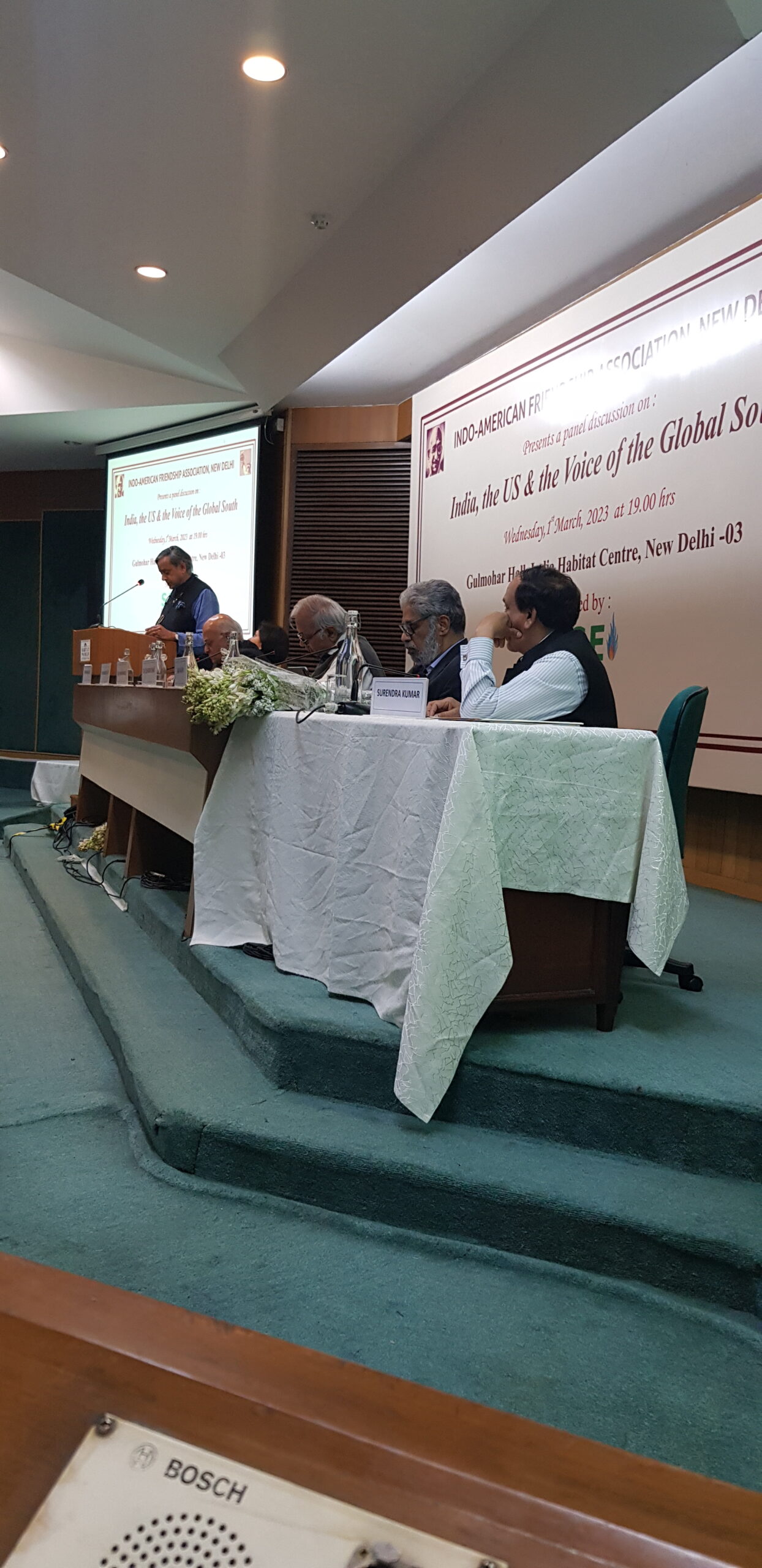‘Millions of Indians feel that India is the natural leader of the Global South’.
NEW DELHI: At a panel discussion of the Indo-American Friendship Association (IAFA) here on 1 March on “India, the US & the Voice of the Global South” five eminent panellists expressed their views on a host of issues.
India, arguably the fastest growing economy in the world with GDP of over three trillion dollars and ranked the 5th largest economy, has addressed deaths, devastation and disruptions caused by the Covid pandemic better than most countries. It has not only administered over two billion vaccination doses to her citizens, but also extended vaccine help to over hundred countries. When Nepal, Syria and Turkiye faced natural disasters, India rushed help swifter than others. Besides Indians, India evacuated many foreign nationals from conflict zones like Libya, Yemen and most recently Ukraine.
According to Italian PM Georgia Meloni who visited India last week, PM Modi is the world’s most popular leader. In a turbulent world still struggling to recover fully from Covid after-effects and now faced with shortages of energy, food grains and fertilizers, thanks to the ongoing Ukraine crises, Modi’s voice is the voice of reason urging dialogue, diplomacy and peaceful solutions of complex, emotive geostrategic issues. For the Indo-Pacific, Quad, G20, the SCO and the climate change discourse, India is a consequential country. Understandably, millions of Indians feel, India is the natural leader of the Global South.
But the Global South is no monolith; it is viewed differently by different countries and people from different perspectives. For BJP leader Seshadri Chari, it can’t be a geographical construct today; prevailing economic conditions and access to fast changing technologies would be a more appropriate criterion for being a part of the Global South.
Former British PM Tony Blair said at the recently concluded Raisina Dialogue Twenty Three that the US has emerged stronger and the most dominant power in a post-Covid world and in the face of the Ukraine crises. It’s closer to NATO than ever. With its domination over the Global Financial institutions and with help from her G-Seven allies, it can unleash severe sanctions as it has done against Russia. In contrast, the devastation caused by Covid and steep downturn in her economy, have retarded China’s prospects of displacing the US as numero uno, at least for now.
The US is India’s largest trading partner and the largest source of superior technologies. It has adopted India as a major defence and strategic partner and accorded STA-One status which puts her on par with her NATO allies for supply of advanced and sensitive technologies.
Former NSA, Shivshankar Menon, felt that the Global South can’t be the NAM of the Cold War period. In today’s unaligned, fragmented world between order, countries would choose different partners for different reasons; it is an era of issue based ad-hoc alliances. One wonders if China, the second largest economy in the world, sitting on the pile of foreign exchange reserves of nearly four trillion dollars could be a part of the Global South. When this question was posed to Menon, he quipped, “it depends how it behaves”.
For Prof Raja Mohan, the era of expansive multilateralism is over; the world is witnessing a great power rivalry between the US and China in which those who have the capacity, the will and stomach to play the game will gain. India’s rediscovery of the Global South is largely attributable to the rise of China. India is a significant pillar of the Global South and its leadership role will be defined by her relations with the US, the EU other members of G7 countries. Raja pointed out that, for the first time, Japan openly voiced that G7 countries have neglected the Global South for long and must reach out to them if they seek their support on the Global Commons. India can be a bridge between the Global North and the Global South.
Shashi Tharoor felt that the world is witnessing four major challenges: challenges of legitimacy, the institutions which came in to existence in after the WWII, can’t represent contemporary realities, for example the UNSC. Crises of sovereignty: in larger groups like the EU, AU member countries do cede certain degree of sovereignty. Crises of collectivity when groups can’t reach a consensus as we saw at the end of G20 FMs’ conference, there was no joint statement; crises of identity: backlash against the globalization and cultural revivalism; assertion of a more authentic and nationalistic identity. Ideally, India should leverage her influence in the Global South to redesign the architecture of Global Governance. Suhasini Haidar felt India has enjoyed a sweet spot in the “all aligned world” by being everything to everyone, being a part of the Global South and also staking a place on the Global High Table but this can’t go on. To further interests of Global South, in the G-20, India could be the leader of G-Eleven which comprises countries other than the G Seven plus China and Russia. Both PM Modi and EAM Jaishankar have amply articulated how India has the highest stakes in a stronger Global South and legitimate credentials to be a leading voice of the Global South. There can’t be any rational argument against it.

